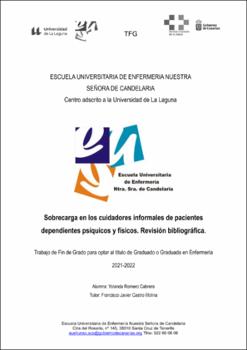Sobrecarga en los cuidadores informales de pacientes dependientes psíquicos y físicos. Revisión bibliográfica.
Autor
Romero Cabrera, YolandaFecha
2022Resumen
Introducción: En los últimos cincuenta años ha tenido lugar un cambio en el perfil epidemiológico. Se ha reducido el
número de enfermedades infecciosas y ha aumentado la prevalencia de las enfermedades crónicas, teniendo que
incrementarse así el número de cuidadores informales, estimándose que entre el Reino Unido y Estados Unidos de
Norteamérica ya hay cincuenta millones. La labor de estos no está siendo remunerada, no tienen horario y lo hacen por
voluntad propia, compromiso afectivo o incluso por obligación. Un cuidador informal es aquella persona que asume el
cuidado directo de otra, se encarga de vigilar, controlar acompañar y apoyar emocionalmente al paciente y gestionar las
labores del hogar.
Objetivos: Esta revisión pretende identificar si existe sobrecarga en los cuidadores informales y como esta puede afectar
a su salud. Además, definir las afecciones psicológicas generadas en los cuidadores informales y como estas se pueden
ver intensificadas en una discapacidad física o psíquica y, por otro lado, identificar qué género se ve más afectado ante
la sobrecarga del cuidador informal.
Metodología: Se realizó una revisión bibliográfica utilizando el formato PRISMA 2020. Para la búsqueda se utilizaron
diferentes bases de datos Pubmed, BVS, PMC, Cochrane Library, SciELO, Scopus y Dialnet, hallando un total de 28
artículos que cumplen los criterios de inclusión y exclusión tras la valoración de lectura crítica con la herramienta de
criterios de calidad CASPe.
Resultados: Los cuidadores informales son generalmente un miembro de la familia, que carece de formación previa de
cómo cuidar a una persona dependiente y lo único que aprenden es a través de la experiencia con el paso de los años.
Se ha evidenciado que la carga se vuelve más pesada cuanto más tiempo se realiza y que el 61,9% de los cuidadores
sufren sobrecarga intensa, situación que les hace recurrir en busca de ayuda profesional. Atender a pacientes con
dependencia física o psíquica acaba acarreando a estos cuidadores un agotamiento tanto físico como mental, donde las
mujeres sufren más físicamente y los hombres se cansan más psicológicamente llegando a derivar en ansiedad o estrés.
Discusión: Existe normativa que asegura unas prestaciones económicas que cubran las necesidades, además de ser una ayuda efectiva para los cuidadores. Sin embargo, debido a las crisis y que el gobierno ha pospuesto las ayudas nunca
han sido del todo efectivas. Con ello podemos decir que se ahorran anualmente millones de euros que podrían invertirlos
en formación psicológica y formación personalizadas aportando herramientas para poder realizar técnicas de manera
adecuadas, pudiendo así reducir la carga de los cuidadores y evitando también dolores físicos.
Conclusión: Se debe fomentar la investigación sobre los cuidadores informales, así como la creación de políticas que
faciliten un desarrollo amable de la actividad cuidadora, para así reducir considerablemente los síntomas de ansiedad,
estrés y depresión. Introduction: In the last 50 years there has been a change in the epidemiological profile. The number of infectious
diseases has been reduced and the prevalence of chronic diseases has increased, therefore having to increase the
number of informal caregivers, rachean an estimate 50 million just between Great Britain and United States of America.
The job of these caregivers is not being remunerated, they have no fixated schedule and they do it on their own free will,
emotional commitment or even by obligation. An informal caregiver is a person who assumes the direct care of another
human being, is responsible for monitoring, controlling, accompanying and emotionally support the patient and managing
household chores.
Objective: This review aims to identify if there exist overload in the informal caregivers and how it can affect their health.
In addition, to define the psychological conditions generated in informal caregivers and how these can be intensified in a
physical or mental disability and, on the other hand, identify which gender is most affected by the overload of the informal
caregiver.
Methodology: A bibliographic review was carried out using the PRISMA 2020 forma. Different databases were used such
as Pubmed, BVS, PMC, Cochran Library, SciELO, Scopus and Dialnet. There were found a total of 28 articles that met
the inclusion and exclusion criteria after the critical reading evaluation of the quality criteria tool CASPe.
Results: Informal caregivers are usually a family member, who lack prior training on how to take care of the dependant
person and all they learn is through the experience they gain over the years. It has been shown that the burden becomes
heavier the longer the job extends and that 61.9% of caregivers suffer intense overload, and reached that point, is when
they end up resorting to professional help. Furthermore, caring for patients with physical or mental dependence ends up
with the caregivers having both physical and mental exhaustion, women tend to suffer more physically and men more
psychologically tired, leading o anxiety or stress.
Discussion: There is a law that ensures financial benefits that cover the needs of the dependent person and in addition
should be an effective help for caregivers. However due to the crises and the fact that the government has postponed it,
the aid has never been fully effective. With this we can say that millions of euros are saved annually that could be invested
in psychological training and personalised training to provide tools to these caregivers so they are able to perform
techniques properly, thus being able to reduce the burden on caregivers and also avoid physical or psychological
extenuation.
Conclusion: Research on informal caregivers should be encouraged, as well as the creation of policies that facilitate the
friendly development of caretaker activity, in order to significantly reduce the symptoms of anxiety, stress and depression.





